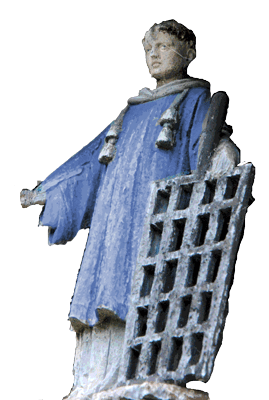
Welcome to St Laurence Church, Appleton with Besselsleigh
A welcoming and inclusive church serving the whole community

Welcome to St Laurence Church, Appleton with Besselsleigh
A welcoming and inclusive church serving the whole community
Readings: Amos 6.1a, 4-7; I Tim 6.6-19; Luke 16.19-31 For someone of limitless means, the rich man’s world had become unaccountably small, stretching no further than his own self-delight, and going no deeper than the designer outfits he wore every day, the costliest purple cloth covering (as Saint Luke somewhat unbiblically mentions) the fine Egyptian cotton of his underwear. This nameless rich man could have gone anywhere and done anything, but every day was the same: the same friends and flatterers fawning on him, eager for invitations to his sumptuous daily banquets, held even on the Sabbath, presumably. Thus he caused his servants to ignore the law of God, by which he himself clearly set no store; ignoring the poor man Lazarus who daily lay at his gates, wracked with the pains of hunger that the scraps falling plentifully from the rich man’s table would have abundantly satisfied. And whereas the Rich Man was luxuriously attired, Lazarus was naked, dressed only in the wounds and sores that the guard-dogs and street-dogs would come and lick, showing a kind of canine compassion so lacking in the wealthy man. (It is thought, by the way, that in ancient times dogs were used in healing remedies, their saliva a sort of primitive peptic antibiotic. Archaeologists have unearthed many hundreds of dog-skeletons in Ashkelon, consistent with this pleasing hypothesis.) The name ‘Lazarus’ means ‘God is my helper’. And so he proved. God helped him through the dogs; and through the men who carried him between the rich man’s gate and wherever he slept at night, giving him sufficient food to keep body and soul together. And he helped him in death, sending the angels to carry him to his rest, to feast at last with Abraham in paradise. The Rich Man also died but, after a no doubt impressive burial, he ended up in the painful jaws of Hades, from where he called out to Abraham, humbly enough at first. ‘Have mercy,’ he cried, sounding for an instant like the beggar he had become. But then the old sense of privilege and entitlement kicked in: ‘Send Lazarus to me to give me water,’ he commanded, revealing that he had known all along who Lazarus was, though he had studiously ignored him in his need. Abraham would not and could not comply. Between their two worlds a great gulf was fixed, and Lazarus could not accede to the Rich Man’s second demand, to go and warn his brothers to repent, and avoid the judgement that he himself had received. ‘They have Moses and the prophets,’ Abraham explained. ‘Let your brothers go to them for instruction. And if they won’t do that, then not even sending them an emissary risen from the grave will persuade them.’ And with that, the reader’s ears prick up, and we see that the story is about salvation in the risen Christ, and our own need to repent in order to receive the abundant new life he offers us. And indeed it could all have ended very differently even for the Rich Man and his five brothers. All six of them could have been saved. Six is a number that modern readers pass over quickly and without comment, taking it to be a mere biographical detail. But in Jewish thought it is a strong and significant symbol of imperfection and incompleteness; some even say it symbolises evil. It echoes the six days of creation, and needs the capstone of the seventh Sabbath day (the Sabbath he ignored) to make his family whole. If only the six rich and self-obsessed men had made a brother out of Lazarus, bringing him from their gate to their table, they would have been the perfect seven, revealing God’s work within them and showing their love of God, by loving their neighbour as themselves. Instead of this, it took the lickings of a dog to show Lazarus the love of God and open up for him what the brothers were denied: the vast panorama of Paradise and feasting for ever on the Beatific Vision of God.
